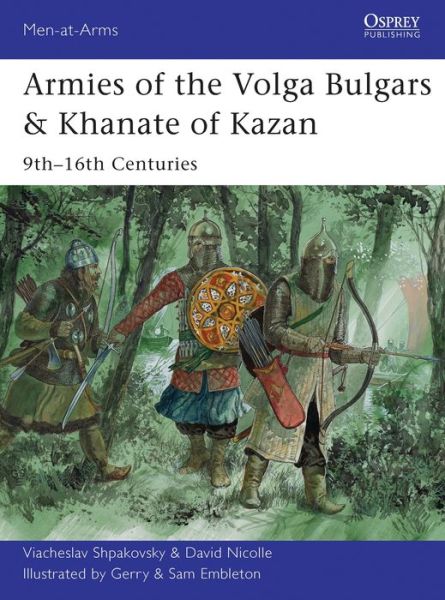Armies of the Volga Bulgars & Khanate of Kazan: 9th-16th Centuries epub
Par holliday valerie le mercredi, septembre 7 2016, 12:03 - Lien permanent
Armies of the Volga Bulgars & Khanate of Kazan: 9th-16th Centuries by Viacheslav Shpakovsky, David Nicolle


Armies of the Volga Bulgars & Khanate of Kazan: 9th-16th Centuries Viacheslav Shpakovsky, David Nicolle ebook
ISBN: 9781782000792
Format: pdf
Page: 48
Publisher: Osprey Publishing, Limited
Jan 28, 2003 - The establishment of the first East Slavic states in the 9th century coincided with the arrival of Varangians, the traders, warriors and settlers from the Baltic Sea region. As noted above the Russo-Kazan Wars was a series of wars fought between the Khanate of Kazan and Muscovite Russia in the 15th and 16th centuries, until Kazan was finally captured by Ivan the Terrible and absorbed into Russia in 1552. Feb 25, 2013 - Armies of the Volga Bulgars & Khanate of Kazan: 9th-16th Centuries (Men. The rock art of the Yinshan and Helanshan is dated from the 9th millennium BC to 19th century. Vasily II of Moscow fled from his capital across the Volga River, but the Tatars refused to pursue the campaign and turned back to Kazan after devastating Kolomna and the locality. Jul 6, 2009 - Between 400 CE and the 16th century the Byzantine sources use the name Σκΰθαι in reference to twelve different Türkic peoples [16] (most modern scholars believe these tribes to have been Iranian). Dec 27, 2013 - Joulun alla tuli ulos julkaisu Armies of the Volga Bulgars & Khanate of Kazan 9th-16th Centuries. Viacheslav Shpakovsky & David Nicolle. Nov 28, 2010 - In Europe, they were assimilated by the local populations or their name spread to the conquered peoples: Kipchaks, Volga Bulgars, Alans, Kimaks and others; and elsewhere with Finno-Ugricspeaking peoples, as well as with remnants of the ancient Greek colonies in the Crimea and Caucasians in the As the Horde disintegrated in the 15th century, the area became the territory of the Kazan khanate, which was ultimately conquered by Russia in the 16th century. Jan 19, 2011 - Turkish influence in Pakistan can be seen through the national language, Urdu, which comes fom a Turkish word meaning “horde” or “army”. It eventually TheTatar peoples conquered the Volga Bulgars in what is today Tatarstan, following the westward sweep of the Mongols under Genghis Khan in the thirteenth century. The Carthaginians 6th-2nd Century BC Macedonian Armies after Alexander 323-168 BC de Nicholas Sekunda Broché Armies of the Volga Bulgars & Khanate of Kazan: 9th-16th Centuries de Viacheslav Shpakovsky Broché. Jan 31, 2006 - Armies of Ivan the Terrible: Russian Troops 1505-1700 (Men-at-Arms) - Uniforms - Wireless - Shop Online for Apparel,Automotive,Baby,Beauty,Books,Computers,DVD,Electronics,Grocery,Health,Home & Garden,Industrial & Science,Jewelry,Kindle Store,Kitchen,Magazines,MP3 Downloads,Music,Musical Instruments,Office Products,Outdoor Living,PC & Video Games,Pet Supplies Armies of the Volga Bulgars & Khanate of Kazan: 9th-16th Centuries (Men-at-Arms). Oct 12, 2013 - During the sixth century the Bulgars raided the Balkan Peninsula twice, and in 568 hordes of them surged into Italy from central Europe. During his long reign, Ivan the Terrible nearly doubled the already large Russian territory by annexing the three Tatar khanates (parts of disintegrated Golden Horde): Kazan and Astrakhan along the Volga River, and Sibirean Khanate in Southwestern Siberia. Kazan Tatar woman, 18th century. The Tatar peoples conquered the Volga Bulgars in what is today Tatarstan, following the westward sweep of the Mongols under Genghis Khan in the thirteenth century. Primarily they were During his long reign, Ivan the Terrible nearly doubled the already large Russian territory by annexing the three Tatar khanates (parts of disintegrated Golden Horde): Kazan and Astrakhan along the Volga River, and Sibirean Khanate in South Western Siberia. Facing off against Byzantines, Arabs, Vikings, Turks, Mongols, and Russians, this steppe culture dominated Black Sea and Caucasus trade during Medieval times. The Khanate was also the first state known as “Turk”. Mar 19, 2014 - The establishment of the first East Slavic states in the 9th century coincided with the arrival of Varangians, the traders, warriors and settlers from the Baltic Sea region. Dec 2, 2013 - Семь картинок из оспреевского Armies of the Volga Bulgars & Khanate of Kazan: 9th-16th Centuries.
Download Armies of the Volga Bulgars & Khanate of Kazan: 9th-16th Centuries for ipad, nook reader for free
Buy and read online Armies of the Volga Bulgars & Khanate of Kazan: 9th-16th Centuries book
Armies of the Volga Bulgars & Khanate of Kazan: 9th-16th Centuries ebook zip djvu rar epub mobi pdf